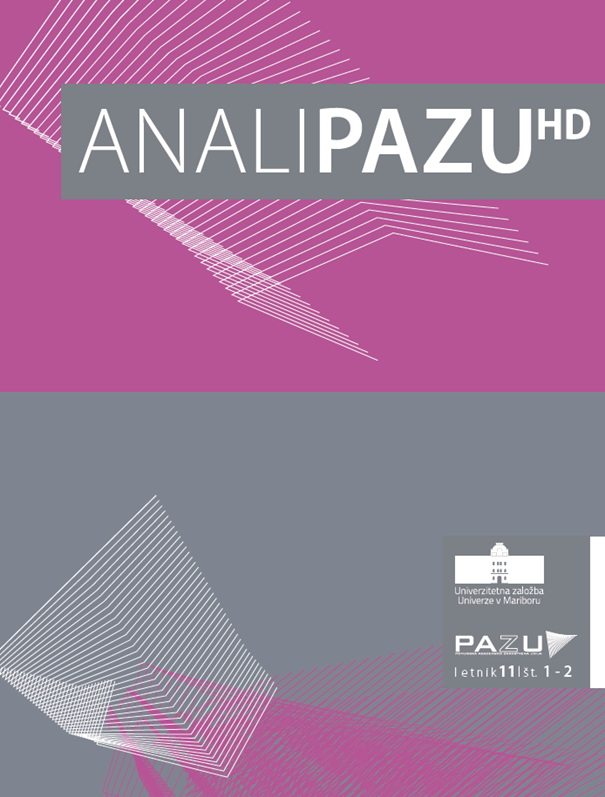Najave in povabila
Rok za oddajo prispevkov za objavo v naslednji številki Anali PAZU HD let. 12, št. 1-2/2026: marec 2026.
Izid naslednje številke ANALI PAZU HD let. 12, št. 1-2/2026: maj 2026.

Rok za oddajo prispevkov za objavo v naslednji številki Anali PAZU HD let. 12, št. 1-2/2026: marec 2026.
Izid naslednje številke ANALI PAZU HD let. 12, št. 1-2/2026: maj 2026.


Uvodnik
PETRA CAJNKO, urednica za področje družboslovja in tehnična urednica
Pred vami je nova številka revije Anali PAZU HD, ki se vsebinsko osredotoča na tri znanstvene prispevke, povezane z aktualnimi družboslovnimi in humanističnimi vprašanji, ki presegajo lokalni okvir ter opozarjajo na strukturne spremembe na področju dela, jezika in varnosti.
Prvi prispevek obravnava problem vezave kolektivnih delavskih pravic na obstoječi slovenski koncept ekonomsko odvisne osebe po ZDR-1. Avtor opozarja, da je institut ekonomske odvisnosti v praksi šibko uveljavljen in pogosto neprimeren kot izhodišče za širitev kolektivnih pravic na samozaposlene, predvsem zaradi individualiziranih postopkov uveljavljanja, strogega praga ekonomske odvisnosti in heterogenosti skupine samozaposlenih. Kadar bi bil z njim povezan še sistem kolektivnega delovnega prava, bi te omejitve dodatno otežile učinkovito organiziranje, pogajanje in zastopanje interesov širšega kroga delavcev izven klasičnih delovnih razmerij.
Drugi prispevek nas popelje v povsem drugačen, a za razumevanje jezikovnega in kulturnega razvoja prav tako ključen okvir. Analiza rokopisnih pridig duhovnika Jožefa Horvata razkriva, kako se je govorec hrvaškega izvora prek procesa jezikovne prilagoditve vključil v prekmursko okolje ter v poznejših pridigah s kombinacijo prekmurskih in osrednjeslovenskih prvin sooblikoval prostor jezikovne posrednosti in kulturnega prehajanja. Pridige tako predstavljajo dragocen vir za razumevanje medjezikovnih stikov in procesov standardizacije slovenščine v začetku 20. stoletja ter kažejo, kako se je jezikovna identiteta gradila skozi prakso, in ne zgolj s kodifikacijo.
V tretjem prispevku sama odpiram razpravo o transformaciji varnosti in obrambnih sil v kontekstu globalizacije, kjer razvoj novih tehnologij, geopolitičnih pritiskov in ekonomskih omejitev ustvarja kompleksne izzive, še posebej za male države. Ti se morajo hkrati prilagajati, specializirati in iskati inovativne modele sodelovanja, ki presegajo tradicionalne nacionalne okvire. Prispevek odpira vprašanje, kako lahko mali sistemi v pogojih omejenih virov zagotavljajo nacionalno varnost, pri tem pa ne žrtvujejo strateške avtonomije in družbene legitimnosti ukrepov.
Skupna nit vseh treh prispevkov je premislek o tem, kako se družbeni sistemi prilagajajo spremembam – naj gre za trg dela, jezikovne norme ali varnostne politike. V vsakem primeru ne gre le za odzivanje na zunanje okoliščine, temveč za zmožnost kritične samorefleksije, inovacije in oblikovanja novih institucionalnih rešitev. Družba, ki se uspešno sooča z izzivi, ni tista, ki ohranja status quo, temveč tista, ki spremembo razume kot prostor odgovornosti in ustvarjalnosti.
Vljudno vabljeni k branju!